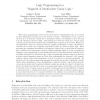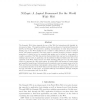565 search results - page 60 / 113 » Extending Answer Sets for Logic Programming Agents |
LICS
1991
IEEE
13 years 11 months ago
1991
IEEE
When logic programming is based on the proof theory of intuitionistic logic, it is natural to allow implications in goals and in the bodies of clauses. Attempting to prove a goal ...
CORR
2007
Springer
13 years 8 months ago
2007
Springer
The Semantic Web drives towards the use of the Web for interacting with logically interconnected data. Through knowledge models such as Resource Description Framework (RDF), the S...
AAAI
2008
13 years 10 months ago
2008
Probabilistic logic programming is a powerful technique to represent and reason with imprecise probabilistic knowledge. A probabilistic logic program (PLP) is a knowledge base whi...
CORR
2010
Springer
13 years 8 months ago
2010
Springer
We propose a method for inferring parameterized regular types for logic programs as solutions for systems of constraints over sets of finite ground Herbrand terms (set constraint s...
ICLP
2005
Springer
14 years 1 months ago
2005
Springer
This paper presents experimental comparisons between declarative encodings of various computationally hard problems in both Answer Set Programming (ASP) and Constraint Logic Progra...


